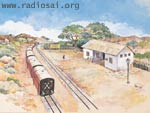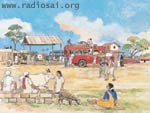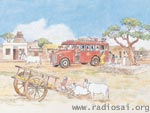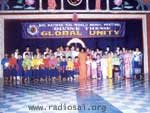|
PUTTAPARTHI, THE GLOBAL VILLAGE
|
Just imagine!
This Puttaparthi that was once a hamlet with a
population of just a little over hundred people,
has now grown to a town with a population of about
a lakh of people. Just wait and see - in a short
while, Puttaparthi is going to become a landmark
on the map of the world. …. It would become
a name to be reckoned with in every major developed
country in the world such as Japan, Germany, Italy,
France, etc. People everywhere would start regarding
Puttaparthi as an important location. The students
of Puttaparthi should realise their good fortune.
- Bhagavan Baba
19th October, 1999.
|
|
Most of you might have come to Puttaparthi
one time or the other to have Swami's Darshan or heard of
it from some friend of yours who has been there. Or at least
seen pictures of it. Whatever may be the case, if one sees
Puttaparthi today, one would scarcely believe that this is
the same village, which 40 years back, has been called 'ten
minutes past the stone age' !
 This
is what one finds in Puttaparthi today: a sprawling, organised
self sustained township, The Prasanthi nilayam. A university
offering the latest courses. A super speciality hospital with
state of the art equipment. Busy streets with people of all
nations, colours, creeds and languages. Automatic teller machines,
branches of major banks, money exchanges, internet parlours,
highrise buildings and cellular towers. Puutaparthi is truly
global. This
is what one finds in Puttaparthi today: a sprawling, organised
self sustained township, The Prasanthi nilayam. A university
offering the latest courses. A super speciality hospital with
state of the art equipment. Busy streets with people of all
nations, colours, creeds and languages. Automatic teller machines,
branches of major banks, money exchanges, internet parlours,
highrise buildings and cellular towers. Puutaparthi is truly
global.
But walk further down
from the ashram and suddenly the landscape changes. There
are closely spaced houses in narrow streets inhabited by simple
and innocent village people. Across the street one may find
a farmer plying his produce on the bullock cart to the local
market. Come rainy season, and scores of village children
can be seen taking a swim in the adjacent Chitravathi river.
Puttaparthi is a village, a beautiful typical Indian village.
To sum it up, it is a Global Village connected by the road,
the rail and the air. 
Reaching the Lord's abode has become relatively easy nowadays
but half a century back it was different. It could probably
be counted in the same league as trekking to the top of the
Everest! There was a reason for this: The time had not yet
come for the world to witness His Glory! The Lord had to give
access only to a few privileged and persistent devotees who
did not mind any difficulties in reaching His abode. The first
difficulty of course was that people did not know that such
a village existed!
 To
get a feel for how it was to come to Puttaparthi about half
a century ago, let us turn to Mrs. Vijayakumari who first
came there in 1945 as a small girl, along with her family.
We pick up her narration from the time their party got down
from the train at Penukonda Railway Station. To
get a feel for how it was to come to Puttaparthi about half
a century ago, let us turn to Mrs. Vijayakumari who first
came there in 1945 as a small girl, along with her family.
We pick up her narration from the time their party got down
from the train at Penukonda Railway Station.
"It was in October
1945 that we first went there. Our train reached Penukonda
station at 1 A.M. It was pitch dark. There was not even a
platform, and we had to jump quickly from the compartment….
There was not a soul in the station. Outside the station,
we saw a few horse carts. Father said, 'It seems there is
a choultry [a free lodge] in the town. Let us go.' ….It
took us one hour to reach the village. The driver asked us
to get down, pointed to a stone slab on the wayside and asked
us to wait there. To our query, 'How is one to spend the night
here?' he gruffly answered, 'Who will open the choultry for
you in the middle of the night? Wait there till the morning.'
With a frown on his face he dumped our luggage on the ground
and left. ….
We spent the rest of
the night in that shed, waiting for dawn. The Rain God sent
a downpour for full two hours.  ….
A troop of monkeys came from apparently nowhere and started
attacking our luggage…At last the bus appeared. But getting
tickets was a problem. It was only after we sat in the bus
that we came to know antagonism towards Swami was the main
reason for not issuing tickets to us. They were using foul
language. 'That little fellow the size of a finger proclaims,
'I am Sai Baba,' and all of you believe him and run after
him like mad people.' Not knowing what to do, we closed our
ears and sat silently. Just then, our vehicle started moving.
It was not a bus; it would be more appropriate to call it
a box made up of tin sheets. …. ….
A troop of monkeys came from apparently nowhere and started
attacking our luggage…At last the bus appeared. But getting
tickets was a problem. It was only after we sat in the bus
that we came to know antagonism towards Swami was the main
reason for not issuing tickets to us. They were using foul
language. 'That little fellow the size of a finger proclaims,
'I am Sai Baba,' and all of you believe him and run after
him like mad people.' Not knowing what to do, we closed our
ears and sat silently. Just then, our vehicle started moving.
It was not a bus; it would be more appropriate to call it
a box made up of tin sheets. ….
We reached Bukkapatnam
around twelve noon. It was a tiny hamlet; there were hardly
about ten houses. We  were
told that from here, we still had to go another five miles
in a bullock cart….. A cart was engaged. … There
was nothing but four uneven wooden planks, on either side.
…. It was a horrible road, full of ups and downs. We
felt that walking might be better than travelling in the cart.
Whenever the cart moved on a slope, the luggage slid towards
the front of the cart, and we had to cling to the boxes, making
sure that we ourselves did not fall down. …. were
told that from here, we still had to go another five miles
in a bullock cart….. A cart was engaged. … There
was nothing but four uneven wooden planks, on either side.
…. It was a horrible road, full of ups and downs. We
felt that walking might be better than travelling in the cart.
Whenever the cart moved on a slope, the luggage slid towards
the front of the cart, and we had to cling to the boxes, making
sure that we ourselves did not fall down. ….
Finally, we reached
Karnataka Nagepalli. We assumed that this was our  destination
but were dismayed when a man told us, 'No, you have to cross
the river and go beyond.' … When we stepped into the
river with gnashing teeth, our feet seem to be sinking in
elbow-deep water. Like the bullocks, we too trudged on behind
the cart driver, panting and puffing. Our throats were parched
and dry. … Somehow we crossed the river and reached the
other shore….Some men were standing on top of a hill
in front of us, waved to us, and started walking towards us.
We were surprised because none of them were known to us. One
boy in that group looked very sweet. He was strikingly charming.
… We thought he was a disciple of Baba. ….. destination
but were dismayed when a man told us, 'No, you have to cross
the river and go beyond.' … When we stepped into the
river with gnashing teeth, our feet seem to be sinking in
elbow-deep water. Like the bullocks, we too trudged on behind
the cart driver, panting and puffing. Our throats were parched
and dry. … Somehow we crossed the river and reached the
other shore….Some men were standing on top of a hill
in front of us, waved to us, and started walking towards us.
We were surprised because none of them were known to us. One
boy in that group looked very sweet. He was strikingly charming.
… We thought he was a disciple of Baba. …..
 No
he was not. That was Baba Himself, come to receive the devotees
whom He, in infinite mercy, was now drawing into His fold!
It is interesting to note that Baba increased His 'following'
in a controlled manner, commensurate with the development
of local facilities on the one hand, and the capacity of the
devotee to put up with inconveniences on the other. With His
powers, Swami could have overnight changed things beyond description;
He did not do that. Instead, He allowed things to evolve in
a measured manner, in the process also demonstrating how villages
could be greatly developed just invoking the power of Love. No
he was not. That was Baba Himself, come to receive the devotees
whom He, in infinite mercy, was now drawing into His fold!
It is interesting to note that Baba increased His 'following'
in a controlled manner, commensurate with the development
of local facilities on the one hand, and the capacity of the
devotee to put up with inconveniences on the other. With His
powers, Swami could have overnight changed things beyond description;
He did not do that. Instead, He allowed things to evolve in
a measured manner, in the process also demonstrating how villages
could be greatly developed just invoking the power of Love.
As Smt.Vijayakumari put it, Swami's love
is the singular cause for the Glory of Puttaparthi, for it
to have found its way on to the world map.
|